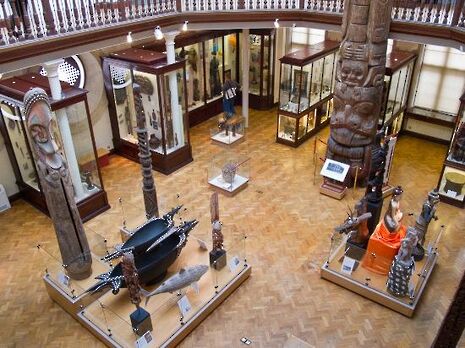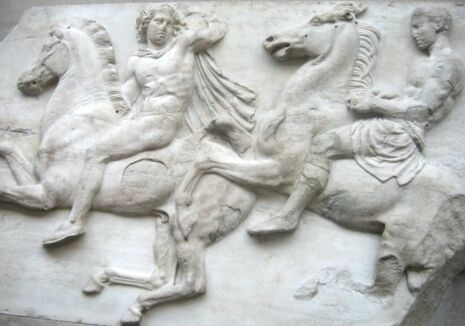Cambridge must return its Benin Bronzes, without condition
There is no legitimate excuse for the Benin Bronzes not to be returned to Nigeria, argues Jason Okundaye

When I was young, I would pester my late father with questions about Nigeria – specifically about the Edo tribe and the Benin Empire. I wanted to know about Edo traditions, culture and literature and the history of The Royal Palace of the Oba. But my Father used to share his disappointment in his lack of knowledge about the rich history of the Benin Empire, and spoke of how our history and culture had been destroyed and stolen by violent British hands. Last year, I consulted my father with regard to the repatriation of the Benin Bronze Okukor. He was moved by the activism of Cambridge students and excited for the restoration of Benin’s artwork. If my father were alive today to witness the proposed plans to loan the University’s collection of Benin Bronzes to Nigeria, he would be disgusted.
Institutions continue to enable cultural imperialism and maintain colonial practice when they engage in the economic exchange of ‘colonial booty’. When British museums attract international audiences intrigued by the Bronzes and other stolen artefacts, do the people of Benin receive a share of the tourism-based revenue? No. Benin once possessed walls four times longer than the Great Wall of China, and beautiful bronze sculptures and ivory carvings that Europeans were ‘shocked’ such ‘savages’ could produce. Yet it is primarily European museums profiting from what little remains of Benin City, and so any attempt to profit financially from the ‘return’ or ‘loan’ of artefacts is nothing short of insulting. The proposal is in no way surprising. In fact, ‘alternative’ proposals to side-step relinquishing stolen precious artefacts has characterised the strategies of British museums since the Court of Benin first called for repatriation in the 1930s. In 2002, the British Museum confessed to selling 30 Benin Bronze artefacts in the 1950s and 60s, some for only £75. Such attempts to concede stolen artworks under the conditions of financial return are as embarrassing and insulting today as they were then.
Benin Bronzes can only be viewed as a symbol of Britain’s historical hooliganism and torment of Nigeria
It is unclear whether Cambridge’s Museum of Anthropology and Archaeology (MAA) is proposing to loan its collected Benin artefacts for a price. Regardless, the proposal reeks of an unfounded entitlement to stolen property which is rooted in a fundamental disrespect for cultures and identities which are not Western European. I say this because artwork looted from Western European families by Nazis have been, and are being, repatriated. Where Western Europe is concerned, discourse around restitution and atonement is taken seriously and indicative of a firm commitment to transitional justice. The topic remains uncontroversial and popular.
The topic should not remain uncontroversial. The return of Greece’s Elgin Marbles invites more controversy and debate due to Greece’s geographical positioning at the tip of the Balkan Peninsula, and its more precarious economic state. However, Greece still finds public British support from figures including Steven Fry and Christopher Hitchens – with many in favour of repatriation. Yet when the same framework of discourse is applied to African, Asian and indigenous cultures the suggestion of repatriation is met largely with dismissal and accusations that such people will be ‘incapable’ of treating their own artefacts with proper care. Internal British support for repatriation of the Benin Bronzes particularly is rare to find beyond activist circles. The late British MP Bernie Grant had been fundamental in establishing the Africa Repatriations Movement in the 1990s, but found himself isolated in Parliament as a result.
Britain should be embarrassed by the spoils of its empire
President of Cambridge’s African-Caribbean Society, Ore Ogunbiyi, highlighted that when Prince Gregory Akenzua of Benin visited Cambridge to renew his appeal for the Benin Bronze Okukor, he was given “a pre-prepared write-up… to read out”. This is suspicious to me; there was a suggestion of ‘agreement’ to the MAA’s ‘loan’ proposal, so why was it necessary to pre-plan a speech for the Prince? The MAA’s conduct is transparent and insulting to the intelligence of Nigerians and Cambridge students of the African diaspora. It is the same arrogance underpinning the refusal to thoroughly consult with the Edo people which characterise accusations against Nigeria’s ability to take care of its own property. Britain directed the spoliation of art and culture in Benin in that fateful 1897 raid which destroyed the city beyond recognition. How Britons can now accuse Nigerians of being unable to look after artefacts which had resided in Benin City for centuries, or how museums can now refuse to respectfully consult with those attempting to reclaim their cultural heritage, is beyond me. More so, considering the narratives surrounding Brexit and appeals for Britain to ‘close our borders’, it’s almost comedic that Britain still clings onto stolen international artefacts for dear life.

Britain should be embarrassed by the spoils of its empire, yet there is the insistence that looted artefacts are ‘better off’ in British museums. I’m uninterested in arguments about the ‘cultural preservation’ of such artefacts as it seems that once an incentive of financial return is attached to repatriation, British institutions are more willing to palm off these precious treasures to whoever is auctioning the highest.
Whether in Cambridge or in Bloomsbury, the Benin Bronzes can only be viewed as a symbol of Britain’s historical hooliganism and torment of Nigeria. Further obstructing the survival of destroyed cultures by not returning stolen cultural items, or making their return conditional, stifles the reclamation of cultural heritage that my father longed to see. A refusal to treat this issue as seriously and respectfully as returning Nazi-stolen paintings is only a testament to the systemic racism still rife within Britain and at institutions such as Cambridge. As a student of colour, however, this narrative is only reflective of Cambridge’s treatment of racial issues within the University, and how the solutions provided are either insulting or insufficient
 News / Report suggests Cambridge the hardest place to get a first in the country23 January 2026
News / Report suggests Cambridge the hardest place to get a first in the country23 January 2026 News / Reform candidate retracts claim of being Cambridge alum 26 January 2026
News / Reform candidate retracts claim of being Cambridge alum 26 January 2026 Interviews / Lord Leggatt on becoming a Supreme Court Justice21 January 2026
Interviews / Lord Leggatt on becoming a Supreme Court Justice21 January 2026 News / Cambridge ranks in the top ten for every subject area in 202623 January 2026
News / Cambridge ranks in the top ten for every subject area in 202623 January 2026 Comment / Cambridge has already become complacent on class23 January 2026
Comment / Cambridge has already become complacent on class23 January 2026









